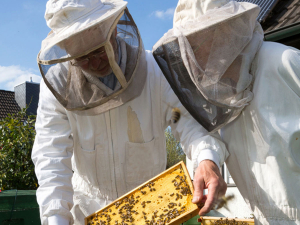Planting to feed the bees
The Ministry for Primary Industries (MPI) have released a handbook offering guidance on how to plant strategically to feed bees.
 Supermarkets have cut the price paid to suppliers, but haven’t cut the price on the shop shelf, claims Lorimer.
Supermarkets have cut the price paid to suppliers, but haven’t cut the price on the shop shelf, claims Lorimer.
Supermarkets have put the squeeze on beekeepers who supply them, claims Jane Lorimer, NZ Beekeeping president.
They have cut the price paid to suppliers, but haven’t cut the price on the shop shelf. So consumers still see honey as really expensive.
“We have cut back but the supermarkets are making more money out of their product. We definitely had the squeeze put on us ‘drop your price or you are out’.”
Head of corporate affairs, Foodstuffs NZ, Antoinette Laird, told Rural News there is currently an over-supply of non-manuka honey varieties in the market which has softened retail prices.
“This is great for shoppers who benefit as honey prices drop - but we do recognise this common supply and demand outcome challenges the supplier community,” she says.
“Last year 500g of Pams Clover Creamed Honey retailed at $12.49 and today costs $6.99 at New World, while Airborne Honey Liquid 500g, which retailed $12.19 in 2019 is now on-shelf at $7.99 – making New Zealand produced honey a very affordable option for more of our customers.”
A Countdown supermarket spokesperson told Rural News the price of honey spiked a couple of years ago and it’s now coming back down due to the changed manuka regulations and an over-supply of clover and blended honeys.
“Our honey prices have dropped about 15% in the last year. Previously the high honey prices meant it was becoming too expensive for customers to choose honey as a spread or ingredient, but we’re starting to see honey sales pick up again now that it’s more affordable for customers.”
Third-year student Cady Burns has won the Waikato Regional Council Prize in Water Science for 2024.
The Rural Change programme, providing free private mental health professional sessions to the rural industry, is set to continue its next chapter within Rural Support Trust from 1 July 2024.
Beef + Lamb New Zealand chief executive Sam McIvor will step down in July.
A new report shows farm employers across the dairy, sheep and beef, and arable sectors have continued to invest strongly in one of their greatest assets – their staff.
The country’s 4200 commercial fruit and vegetable growers will vote from May 14 on a new HortNZ levy.

OPINION: The new government has clearly signalled big cuts across the public service.
OPINION: Your canine crusader is not surprised by the recent news that New Zealand plant-based ‘fake meat’ business is in…